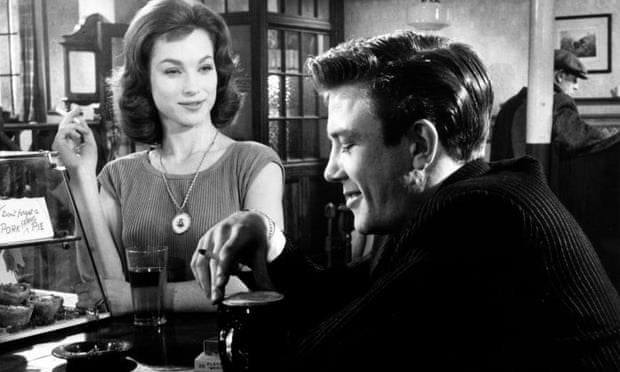A Review of the Classic 1960 Film Saturday Night and Sunday Morning
By Michelle Strozykowski

Director Karel Reisz's Saturday Night and Sunday Morning is the classic story of the 'angry young man'. It heralded the beginning of a new kind of cinema for British audiences.
Saturday Night and Sunday Morning is a classic social realist drama of the British New Wave. Made in 1960, it was groundbreaking in both its portrayal of the industrial nightmare of working class factory life, and its unrepentant, cocky anti-hero Arthur Seaton.
-
The British New Wave and La Nouvelle Vague
Saturday Night and Sunday Morning (1960) was Karel Reisz's first feature film, made in the light of a number of outstanding documentaries from the 'Free Cinema' movement. Interestingly, this film emerged at the same time as Jean-Luc Godard's debut feature A Bout de Souffle (Breathless). Reisz and Godard, the enfant terrible of the 'French New Wave', shared certain traits. Both were critics-turned film-makers whose debut films were the first commercial hits of their respective 'new waves', and both films were anti-establishment pieces from directors with political agendas.
The Angry Young Man
Saturday Night and Sunday Morning was a film to which many people could relate. Author Alan Sillitoe, who adapted his book for the screen, was the creator of one of the original 'angry young men' of cinema history Arthur Seaton. Arthur is a working class anti-hero whose boredom of factory life is assuaged only by his reckless attitude to life. Trapped in a dead end job, Arthur represents the individual against the system.
Arthur's infamous line -
"Don't let the bastards grind you down."
is his clarion call to the masses.
Arthur is blunt, cocky, and out for a good time with women, booze and a well cut suit. He makes the most of his leisure time in an attempt to escape the mediocrity of his life. But he is angry. Angry about the restrictions placed on him by society and his working class life. Angry about his lot. In 1960 when this film was released, the main cause of his aggression - factory life - united a public who recognised and shared this anger. Ordinary people flocked in droves to see the film, cognizant of seeing their own lives represented on screen for one of the first times.
The Character's Fatal Flaw
At the beginning of the film Arthur is having an affair with Brenda, a married woman, whom he gets pregnant. He tries to help her when she says she wants an abortion, although ultimately this is unsuccessful. It is a testament to the film-makers that this dark storyline does not alienate the audience. In fact, for all his gruff rabble-rousing Arthur remains a rather likeable, if flawed, character throughout.
He gets a sort of comeuppance when Brenda's brother-in-law beats him up at the Nottingham Goose Fair, but even then audience sympathy is still very much with Arthur. This is due, in no small part, to Albert Finney's naturalistic portrayal of the character as a working class lad coming to bitter terms with the responsibilities of manhood.
-
The Midlands - A Fitting Backdrop for Social Realism
Setting the film in Nottingham adds a further dimension of imprisonment, using iconography which has since come to be ingrained in British cinema. The imposing chimney stacks belching out black smoke, and the faceless factories for example; used to increase feelings of claustrophobia and provincial entrapment.
Karel Reisz had already shown in his documentaries Everyday Except Christmas and We Are the Lambeth Boys that ordinary people could provide great stories and entertainment. But it's through his visual choices, his very eye as a director, that we also manage to perceive a certain poeticism to the socially troubled world of the protagonists. Images Reisz first captured in Saturday Night and Sunday Morning have since become so embedded in British films they act as a shorthand, expertly and succinctly typifying a landscape still seen today within the social realist cinematic cannon.